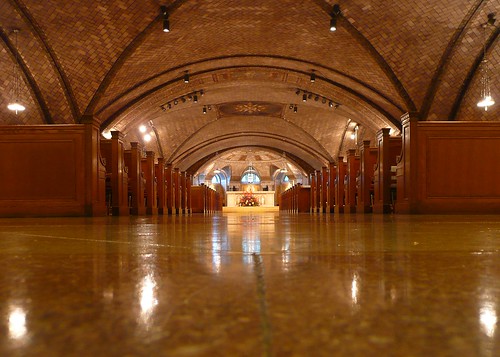 |
| National Shrine of the Immaculate Conception in Washington, DC |
He went down with them and came to Nazareth,
and was obedient to them;
and his mother kept all these things in her heart.
and his mother kept all these things in her heart.
The story is told that when her pastor asked Saint Bernadette Soubirous what name the Woman had given to her, she replied, “I am the Immaculate Conception.” The priest exclaimed, “That’s impossible. No one is the Immaculate Conception.”
Although the doctrine had been around for centuries, Pope Pius IX had only recently defined it as an infallible teaching of the Church. The statement reads only that Mary was “immaculately conceived.” (That is, she was without sin, even original sin, from the day of her conception until the day she died.) But the title “The Immaculate Conception” apparently was not a common name or title for the Mother of Jesus.
A century and a half later, the name and title are widely honored throughout the Catholic Church. Many Catholic parishes are named Immaculate Conception and Immaculate Heart of Mary including the Basilica in Washington DC.
But even yet, the doctrine is not well understood and its meaning is largely ignored by Catholics and Christians alike. The Conventual Franciscan Saint Maximilian Kolbe (priest and martyr, died 1941) said of Mary: “She was the Mother of God because she was the Immaculate Conception, and she was the Immaculate Conception because she was the Mother of God.” As simple as that sounds, it is a great insight for many people who revere the Blessed Mother but never think about her titles.
Blessed John Duns Scotus, one of the most brilliant medieval scholars, was the greatest champion of this doctrine, because it fit into his vision of the Incarnation. He taught that God’s original plans for the universe and the human race were never disturbed by human sin. It is impossible that the Lord and God of the Universe whose majesty surpasses anything even the universe can contain, should have to change his plans because of some human sinfulness.
Rather, from the very beginning, God intended that Jesus should be born in our world. His creation would not be complete until the Incarnation was complete. If the earth is not worthy to receive the infinitely priceless gift of God it’s only in part due to human sin. It is impossible that finite matter should contain the infinite God, much less be worthy of it. But God made it worthy by creating one woman to be the worthy mother of God. She alone was given the grace of "immaculation." Some would doubt her worthiness but, as the Angel Gabriel told her, “Nothing is impossible with God!” if God deems her worthy, who am I to say she can’t be?
Mary's worthiness is not simply freedom from the guilt of sin. She was given the wisdom to see it clearly, in all its repulsiveness, and cannot be fascinated by its misleading possibilities. Growing through every experience of her life, she becomes more worthy of the grace given to her, as a superb violin becomes more beautiful the more it is used. Mary is worthy as a gold cup is more worthy than a tin can, or a silk purse than a sow’s ear. Only God could effect such a miracle.
Nor would she be any less human for being sinless; sin makes one less human, not more so! Jesus never sinned and he is most certainly fully human. His innocence and Mary's proclaim the destiny of virginal innocence that God has promised to each of us.
Lest you think this is all idle speculation, remember that we try to give our children graces similar to "immaculation" when we protect them from harm and urge them to avoid sinful situations. We teach them virtue and common sense and point out dangers for them to avoid. Thus do we fulfill the promises made when we baptized them.
Beyond the home the Church creates a community and a culture where sin has less appeal for all of us. There are many thoughts, words and deeds that simply don’t belong, that never even occur to us because we live in the Church.
Beyond the home the Church creates a community and a culture where sin has less appeal for all of us. There are many thoughts, words and deeds that simply don’t belong, that never even occur to us because we live in the Church.
 |
| Crypt Church of the National Shrine where I was ordained a deacon in 1973 |
And rightly have we contemplated that greeting throughout the centuries
No comments:
Post a Comment
I love to write. This blog helps me to meditate on the Word of God, and I hope to make some contribution to our contemplations of God's Mighty Works.
Ordinarily, I write these reflections two or three weeks in advance of their publication. I do not intend to comment on current events.
I understand many people prefer gender-neutral references to "God." I don't disagree with them but find that language impersonal, unappealing and tasteless. When I refer to "God" I think of the One whom Jesus called "Abba" and "Father", and I would not attempt to improve on Jesus' language.
You're welcome to add a thought or raise a question.